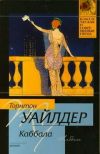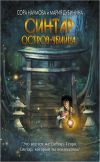Текст книги "Лексикология современного английского языка"

Автор книги: Коллектив авторов
Жанр: Прочая образовательная литература, Наука и Образование
сообщить о неприемлемом содержимом
Текущая страница: 4 (всего у книги 4 страниц) [доступный отрывок для чтения: 1 страниц]
When Sue awoke from an hour’s sleep the next morning she found Johnsy with dull, wide-open eyes staring at the drawn green shade.
“Pull it up; I want to see,” she ordered, in a whisper.
Wearily Sue obeyed.
But, lo! after the beating rain and fierce gusts of wind that had endured through the livelong night, there yet stood out against the brick wall one ivy leaf. It was the last on the vine. Still dark green near its stem, but with its serrated edges tinted with the yellow of dissolution and decay, it hung bravely from a branch some twenty feet above the ground.
“It is the last one,” said Johnsy. “I thought it would surely fall during the night. I heard the wind. It will fall to-day, and I shall die at the same time.”
“Dear, dear!” said Sue, leaning her worn face down to the pillow, “think of me, if you won’t think of yourself. What would I do?”
But Johnsy did not answer. The lonesomest thing in all the world is a soul when it is making ready to go on its mysterious, far journey. The fancy seemed to possess her more strongly as one by one the ties that bound her to friendship and to earth were loosed.
The day wore away, and even through the twilight they could see the lone ivy leaf clinging to its stem against the wall. And then, with the coming of the night the north wind was again loosed, while the rain still beat against the windows and pattered down from the low Dutch eaves. When it was light enough Johnsy, the merciless, commanded that the shade be raised.
The ivy leaf was still there.
Johnsy lay for a long time looking at it. And then she called to Sue, who was stirring her chicken broth over the gas stove.
“I’ve been a bad girl, Sudie,” said Johnsy. “Something has made that last leaf stay there to show me how wicked I was. It is a sin to want to die. You may bring me a little broth now, and some milk with a little port in it, and – no; bring me a hand-mirror first, and then pack some pillows about me, and I will sit up and watch you cook.”
An hour later she said.
“Sudie, some day I hope to paint the Bay of Naples.”
The doctor came in the afternoon, and Sue had an excuse to go into the hallway as he left.
“Even chances,” said the doctor, taking Sue’s thin, shaking hand in his. “With good nursing you’ll win. And now I must see another case I have downstairs. Behrman, his name is – some kind of an artist, I believe. Pneumonia, too. He is an old, weak man, and the attack is acute. There is no hope for him; but he goes to the hospital to-day to be made more comfortable.”
The next day the doctor said to Sue: “She’s out of danger. You’ve won. Nutrition and care now – that’s all.”
And that afternoon Sue came to the bed where Johnsy lay, contentedly knitting a very blue and very useless woolen shoulder scarf, and put one arm around her, pillows and all.
“I have something to tell you, white mouse,” she said. “Mr. Behrman died of pneumonia to-day in the hospital. He was ill only two days. The janitor found him on the morning of the first day in his room downstairs helpless with pain. His shoes and clothing were wet through and icy cold. They couldn’t imagine where he had been on such a dreadful night. And then they found a lantern, still lighted, and a ladder that had been dragged from its place, and some scattered brushes, and a palette with green and yellow colors mixed on it, and – look out the window, dear, at the last ivy leaf on the wall. Didn’t you wonder why it never fluttered or moved when the wind blew? Ah, darling, it’s Behrman’s masterpiece – he painted it there the night that the last leaf fell.”
(An extract from The Last Leaf by O. Henry)
Text 8
It was neither the season nor the hour when the Park had frequenters; and it is likely that the young lady, who was seated on one of the benches at the side of the walk, had merely obeyed a sudden impulse to sit for a while and enjoy a foretaste of coming Spring.
She rested there, pensive and still. A certain melancholy that touched her countenance must have been of recent birth, for it had not yet altered the fine and youthful contours of her cheek, nor subdued the arch though resolute curve of her lips.
A tall young man came striding through the park along the path near which she sat. Behind him tagged a boy carrying a suit-case. At sight of the young lady, the man’s face changed to red and back to pale again. He watched her countenance as he drew nearer, with hope and anxiety mingled on his own. He passed within a few yards of her, but he saw no evidence that she was aware of his presence or existence.
Some fifty yards further on he suddenly stopped and sat on a bench at one side. The boy dropped the suit-case and stared at him with wondering, shrewd eyes. The young man took out his handkerchief and wiped his brow. It was a good handkerchief, a good brow, and the young man was good to look at. He said to the boy:
“I want you to take a message to that young lady on that bench. Tell her I am on my way to the station, to leave for San Francisco, where I shall join that Alaska moose-hunting expedition. Tell her that, since she has commanded me neither to speak nor to write to her, I take this means of making one last appeal to her sense of justice, for the sake of what has been. Tell her that to condemn and discard one who has not deserved such treatment, without giving him her reasons or a chance to explain is contrary to her nature as I believe it to be. Tell her that I have thus, to a certain degree, disobeyed her injunctions, in the hope that she may yet be inclined to see justice done. Go, and tell her that.”
The young man dropped a half-dollar into the boy’s hand. The boy looked at him for a moment with bright, canny eyes out of a dirty, intelligent face, and then set off at a run. He approached the lady on the bench a little doubtfully, but unembarrassed. He touched the brim of the old plaid bicycle cap perched on the back of his head. The lady looked at him coolly, without prejudice or favour.
“Lady,” he said, “dat gent on de oder bench sent yer a song and dance by me. If yer don’t know de guy, and he’s tryin’ to do de Johnny act, say de word, and I’ll call a cop in t’ree minutes. If yer does know him, and he’s on de square, w’y I’ll spiel yer de bunch of hot air he sent yer.”
The young lady betrayed a faint interest.
“A song and dance!” she said, in a deliberate sweet voice that seemed to clothe her words in a diaphanous garment of impalpable irony. “A new idea – in the troubadour line, I suppose. I – used to know the gentleman who sent you, so I think it will hardly be necessary to call the police. You may execute your song and dance, but do not sing too loudly. It is a little early yet for open-air vaudeville, and we might attract attention.”
“Awe,” said the boy, with a shrug down the length of him, “yer know what I mean, lady. ‘Tain’t a turn, it’s wind. He told me to tell yer he’s got his collars and cuffs in dat grip for a scoot clean out to Frisco. Den he’s goin’ to shoot snow-birds in de Klondike. He says yer told him not to send ‘round no more pink notes nor come hangin’ over de garden gate, and he takes dis means of puttin’ yer wise. He says yer refereed him out like a has-been, and never give him no chance to kick at de decision. He says yer swiped him, and never said why.”
The slightly awakened interest in the young lady’s eyes did not abate. Perhaps it was caused by either the originality or the audacity of the snow-bird hunter, in thus circumventing her express commands against the ordinary modes of communication. She fixed her eye on a statue standing disconsolate in the dishevelled park, and spoke into the transmitter:
“Tell the gentleman that I need not repeat to him a description of my ideals. He knows what they have been and what they still are. So far as they touch on this case, absolute loyalty and truth are the ones paramount. Tell him that I have studied my own heart as well as one can, and I know its weakness as well as I do its needs. That is why I decline to hear his pleas, whatever they may be. I did not condemn him through hearsay or doubtful evidence, and that is why I made no charge. But, since he persists in hearing what he already well knows, you may convey the matter.”
“Tell him that I entered the conservatory that evening from the rear, to cut a rose for my mother. Tell him I saw him and Miss Ashburton beneath the pink oleander. The tableau was pretty, but the pose and juxtaposition were too eloquent and evident to require explanation. I left the conservatory, and, at the same time, the rose and my ideal. You may carry that song and dance to your impresario.”
“I’m shy on one word, lady. Jux… jux – put me wise on dat, will yer?”
“Juxtaposition – or you may call it propinquity – or, if you like, being rather too near for one maintaining the position of an ideal.”
The gravel spun from beneath the boy’s feet. He stood by the other bench. The man’s eyes interrogated him, hungrily. The boy’s were shining with the impersonal zeal of the translator.
“De lady says dat she’s on to de fact dat gals is dead easy when a feller comes spielin’ ghost stories and tryin’ to make up, and dat’s why she won’t listen to no soft-soap. She says she caught yer dead to rights, huggin’ a bunch o’ calico in de hot-house. She side-stepped in to pull some posies and yer was squeezin’ de oder gal to beat de band. She says it looked cute, all right all right, but it made her sick. She says yer better git busy, and make a sneak for de train.”
The young man gave a low whistle and his eyes flashed with a sudden thought. His hand flew to the inside pocket of his coat, and drew out a handful of letters. Selecting one, he handed it to the boy, following it with a silver dollar from his vest-pocket.
“Give that letter to the lady,” he said, “and ask her to read it. Tell her that it should explain the situation. Tell her that, if she had mingled a little trust with her conception of the ideal, much heartache might have been avoided. Tell her that the loyalty she prizes so much has never wavered. Tell her I am waiting for an answer.”
The messenger stood before the lady.
“De gent says he’s had de ski-bunk put on him widout no cause. He says he’s no bum guy; and, lady, yer read dat letter, and I’ll bet yer he’s a white sport, all right.”
The young lady unfolded the letter; somewhat doubtfully, and read it.
DEAR DR. ARNOLD,
I want to thank you for your most kind and opportune aid to my daughter last Friday evening, when she was overcome by an attack of her old hearttrouble in the conservatory at Mrs. Waldron’s reception. Had you not been near to catch her as she fell and to render proper attention, we might have lost her. I would be glad if you would call and undertake the treatment of her case.
Gratefully yours, Robert Ashburton.
The young lady refolded the letter, and handed it to the boy.
“De gent wants an answer,” said the messenger. “Wot’s de word?”
The lady’s eyes suddenly flashed on him, bright, smiling and wet. “Tell that guy on the other bench,” she said, with a happy, tremulous laugh, “that his girl wants him.”
(An extract from Courier by O. Henry)
Вопросы к экзамену
1. Subject of lexicology.
2. Referential and Functional Approaches to Meaning.
3. Types of Meaning.
4. Semantic Change.
5. Word-structure: Types of Word Segmentability.
6. Word-structure: Classification of Morphemes.
7. Word-structure: Analysis into I. C.
8. Main Types of Word-building.
9. Minor Types of Word-building.
10. Homonymy.
11. Synonyms and Antonyms.
12. Phraseology.
13. Regional Varieties of English.
14. Methods of Lexicological Research.
15. Lexicography.
Список рекомендуемой Литературы
Основная
Арнольд И. В. Лексикология современного английского языка / И. В. Арнольд. М.: Высш. шк., 2012.
Антрушина Г. Б. Лексикология английского языка / Г. Б. Антрушина, О. В. Афанасьева, Н. Н. Морозова. М.: Высш. шк., 2010.
Гинзбург Р. З. Лексикология английского языка: учеб. для ин-тов и фак. иностр. яз. / Р. З. Гинзбург. М.: Высш. шк., 1979.
Дополнительная
Борисов В. В. Аббревиация и акронимия: Военные и научно-технические сокращения в иностранных языках / В. В. Борисов. М.: Воениздат, 1972.
Будагов Р. А. Новые слова и значения // Человек и его язык / Р. А. Будагов. М., 1976.
Волков С. С. Неологизмы и внутренние стимулы языкового развития / С. С. Волков, Е. В. Сенько // Новые слова и словари новых слов. Л., 1983.
Заботкина В. И. Неологизмы в современном английском языке / В. И. Заботкина, Г. М. Степанов. Калининград, 1982.
Заботкина В. И. Новая лексика современного английского языка / В. И. Заботкина. М., 1989.
Ивлева Г. Г. Тенденции развития словарного состава / Г. Г. Ивлева. М., 1986.
Каращук П. М. Словообразование английского языка / П. М. Каращук. М., 1977.
Кубрякова Е. С. Роль словообразования в формировании языковой картины мира / Е. С. Кубрякова // Роль человеческого фактора в языке: Язык и картина мира. М., 1988.
Силис Я. Я. Лингвистическое и социальное в неологии британского варианта современного английского обращения / Я. Я. Силис // Неологизмы в лексике, грамматике и фонетике. Рига, 1985.
Тимошенко Т. Р. Телескопия в словообразовательной системе современного английского языка / Т. Р. Тимошенко. Киев, 1976.
Телия В. Н. Типы языковых значений / В. Н. Телия. М.: Наука, 1981.
Adams V. Introduction into English Word-Formation / V. Adams. L., 1983.
Cannon G. Historical Сhanges and English Word-Formation: New Vocabulary Items / G. Cannon. N. Y., 1986.
Howard Ph. New Words for Old / Ph. Howard. Lnd., 1979. Linguistic and Literary Broad Research and Innovation. 2010. Vol. 1, Iss. 1.
Marchland H. The Categories and Types of Present-Day English WordFormation / H. Marchland. Wiesbaden, 1960.
Seymour R. K. Bibliography of Word-Formation in the Germanic Languages / R. K. Seymour. Munchen, 1969.
Stein G. English Word-Formation over Two Centuries / G. Stein. Tubingen, 1973.
Traugott E. C. Regularity in Semantic Change / E. C. Traugott, R. B. Dasher. Cambridge: Univ. Press, 2002.
Правообладателям!
Данное произведение размещено по согласованию с ООО "ЛитРес" (20% исходного текста). Если размещение книги нарушает чьи-либо права, то сообщите об этом.Читателям!
Оплатили, но не знаете что делать дальше?








































